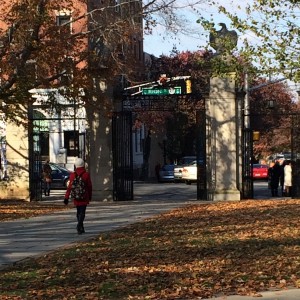
When I finally walk out of the Fitz-Randolph gates on June 3, 2015, after years of careful avoidance, I will no longer be able to list “student” as occupation on forms. Naturally, this thought ignites internal panic—with only a few short weeks and a semester left of my college experience, I only have a few short weeks plus one semester left to complete my senior thesis, and conclude my formal academic career.
I would love for my thesis to be the greatest piece of written work I’ve ever composed, while simultaneously reflecting the type of student and learner I was at Princeton. I want it to inform, entertain, and, perhaps above all, make readers wonder, “Wow, who was the girl that wrote this? I definitely want to know her.” I will put all my might into making these three things happen, but I’ve come to realize that, realistically, the thesis will not be perfect. There are going to be sentences that I think are wonderful, but, to an outside reader, will make about 4% sense. I am going to make arguments that have readers saying, “Wow, who was the girl that wrote this? I completely disagree.” But though my thesis cannot and will not be flawless, my career as a student isn’t coming to an end upon graduation. And I think this former misconception was part of the reason my thesis’s perfection carried so much weight in my mind.
While I want to make the most of my last few months at Princeton and submit final pieces of work of which I am proud, I will always be a student. Just because theses and Dean’s Date don’t exist in my life after commencement, does not mean I will stop learning on a daily basis. In fact, I will be doing just as much learning, if not more — just in very different ways. The formation of my personal legacy as a student and a learner does not have to be completed in the next six months, as I once thought at the beginning of this year. I’m not exactly sure what changed my mind. Perhaps it was applying to jobs whose descriptions may well have been written in a foreign language that sparked the “I probably will not know a lot of things when I get out of here, and will have to learn them each and everyday” revolution in my mind— I’m not exactly sure.
All I really do know is that, while I still want to make my thesis the most quality piece of work it possibly can be, it is not the be-all end-all of my academic career. After its submission, I have years and years of learning ahead of me. I will use my thesis as a stepping-stone into the real world, the beginning of my legacy as a student, not as an end.
— Annie Woehling, Social Sciences Correspondent

